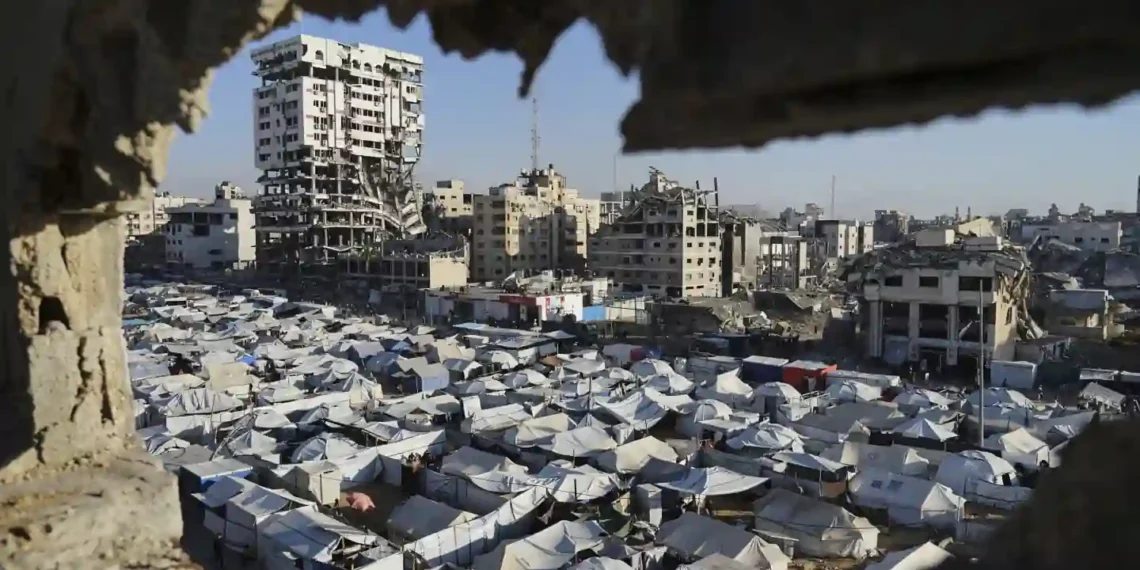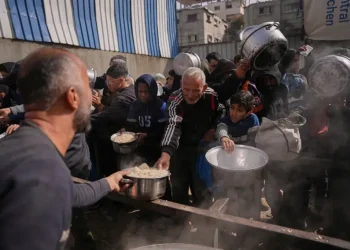New U.S.-Backed Plan Faces Pushback from Aid Organizations
A new proposal from the Gaza Humanitarian Foundation, a group backed by U.S. security contractors and former military officers, aims to take over the distribution of aid in Gaza, following a plan similar to Israel’s strategy. The foundation’s goal is to replace the existing distribution system run by the United Nations and other international aid agencies, a move that has sparked controversy and concern.
The Proposal and Its Supporters
The Gaza Humanitarian Foundation’s proposal suggests creating four aid distribution hubs across Gaza to supply food, water, and hygiene kits to the population. The plan has the backing of the U.S. government and former U.N. World Food Program director David Beasley, who is considered for a leadership role. However, the proposal’s details remain under discussion, and it has not been fully endorsed by all parties involved.
Israel’s Control of Aid
Israel has blockaded Gaza for over two months, stopping the entry of essential supplies such as food, medicine, and fuel. The country insists that any aid distribution must be managed in a way that allows Israel to maintain control, particularly to prevent the diversion of resources to Hamas and other militants. The Gaza Humanitarian Foundation’s proposal mirrors Israel’s concerns by centralizing aid distribution, but it has not clarified how it will balance humanitarian needs with security concerns.
The Role of Private Security
One of the most controversial aspects of the proposal is the involvement of private security companies to ensure the safe transportation and distribution of aid. The foundation plans to use armored vehicles and other security measures to protect supplies from being intercepted by militants or criminal gangs. Aid workers have expressed concerns that this could blur the lines between humanitarian work and military objectives, potentially putting civilians at risk and undermining the neutrality of aid efforts.
Concerns from Aid Workers
Several humanitarian organizations, including the U.N. and the Norwegian Refugee Council, have voiced concerns that this plan could displace large numbers of Palestinians and forcibly concentrate them around aid hubs. They argue that such an approach could be used to further Israel’s political and military goals, effectively reshaping Gaza’s population distribution in a way that might lead to further displacement and suffering.
Shaina Low, a communications adviser for the Norwegian Refugee Council, called the proposal “a solution to a problem that doesn’t really exist,” referring to Israel’s claims that Hamas diverts aid. Aid workers also worry that the private security element could undermine the principles of humanitarian neutrality, especially if contractors with military ties are involved in overseeing distribution.
The Future of Aid in Gaza
While the Gaza Humanitarian Foundation insists its approach is focused purely on delivering aid to those in need, critics argue that it could have far-reaching implications for both the humanitarian situation and the political landscape in Gaza. With the situation in Gaza continuing to deteriorate, the international community is closely monitoring the development of this proposal and its potential impact on one of the world’s most urgent humanitarian crises.
What’s Next?
The proposal is still in its early stages, and it remains unclear whether it will be implemented. However, the involvement of private security companies, the focus on centralized aid hubs, and the apparent alignment with Israeli policies have already raised alarms. As more details emerge, aid organizations and humanitarian groups are urging the international community to carefully consider the consequences of such a plan.
This article was rewritten by JournosNews.com based on verified reporting from trusted sources. The content has been independently reviewed, fact-checked, and edited for accuracy, neutrality, tone, and global readability in accordance with Google News and AdSense standards.
All opinions, quotes, or statements from contributors, experts, or sourced organizations do not necessarily reflect the views of JournosNews.com. JournosNews.com maintains full editorial independence from any external funders, sponsors, or organizations.
Stay informed with JournosNews.com — your trusted source for verified global reporting and in-depth analysis. Follow us on Google News, BlueSky, and X for real-time updates.













